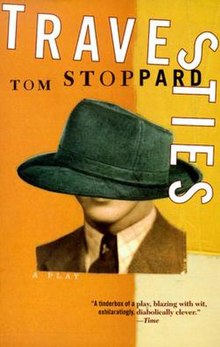Travesties
| Travesties | |
|---|---|
 |
|
| Written by | Tom Stoppard |
| Characters | James Joyce Bennett Nadezhda Krupskaya Tristan Tzara Cecily Carruthers Gwendolen Carr Vladimir Ilyich Ulyanov Henry Carr |
| Date premiered | 10 June 1974 |
| Place premiered |
Aldwych Theatre London, England |
| Original language | English |
| Subject | An extravaganza of political history, literary pastiche, and Wildean parody, introducing Dadaist Tristan Tzara and Lenin his wife |
| Genre | Comedy |
| Setting | Zürich, Switzerland, 1917 |
Travesties is a 1974 play by Tom Stoppard. The play centres on the figure of Henry Carr, an elderly man who reminisces about Zürich in 1917 during the First World War, and his interactions with James Joyce when he was writing Ulysses, Tristan Tzara during the rise of Dada, and Lenin leading up to the Russian Revolution, all of whom were living in Zürich at that time.
The play's setting is primarily Zürich, Switzerland during the First World War. Three important personalities were living in Zürich at that time: the modernist author James Joyce, the communist revolutionary Lenin, and the founder of Dada, Tristan Tzara. In the play the less notable English consular official Henry Carr, who is likewise a real person and was similarly in Zürich, recalls his perceptions and his experiences with these influential figures. As he reminisces Carr's memory becomes prone to distraction, and instead of predictable historical biography these characters are interpreted through the maze of his mind.
Carr's memories are couched in a Zürich production of Oscar Wilde's play The Importance of Being Earnest in which he had a starring role. Stoppard uses this production and Carr's mixed feelings surrounding it as a framework to explore art, the war and revolution. Situations from Earnest feature prominently within the action. The characters in Travesties also include versions of two characters from Earnest, Gwendolen and Cecily, and the comedic situations of many of the other roles are shared by other characters. Stoppard uses many theatrical devices within the play, including puns, limericks, and an extended parody of the vaudeville song "Mister Gallagher and Mister Shean".
...
Wikipedia
